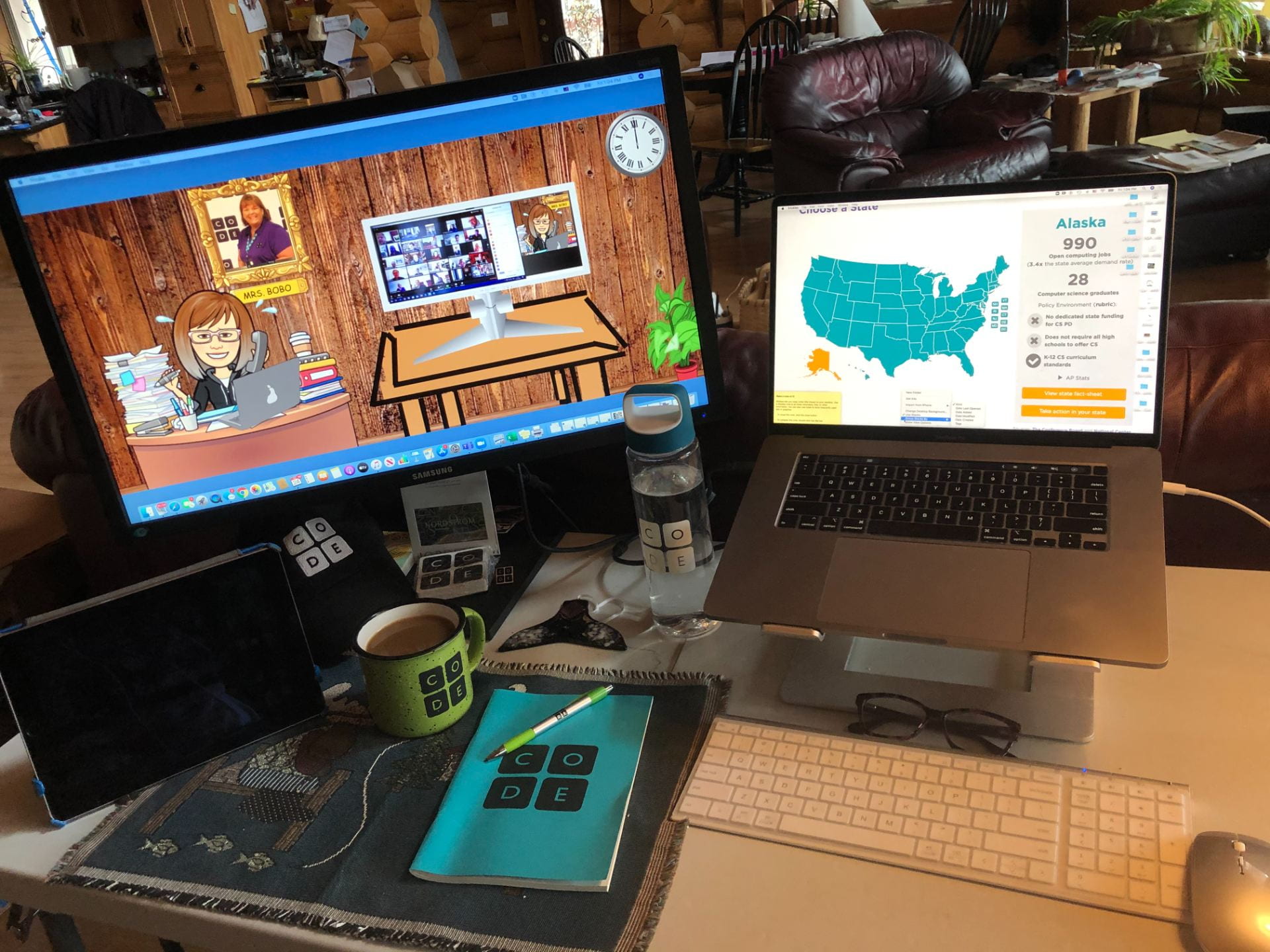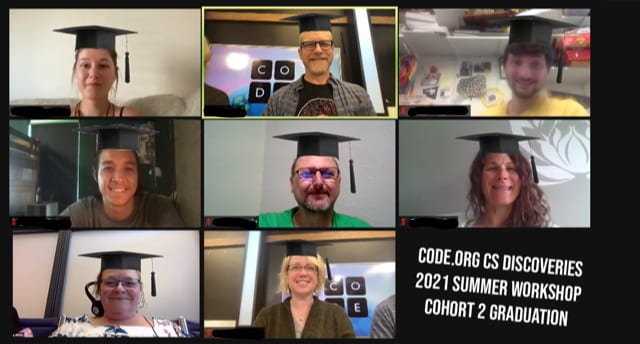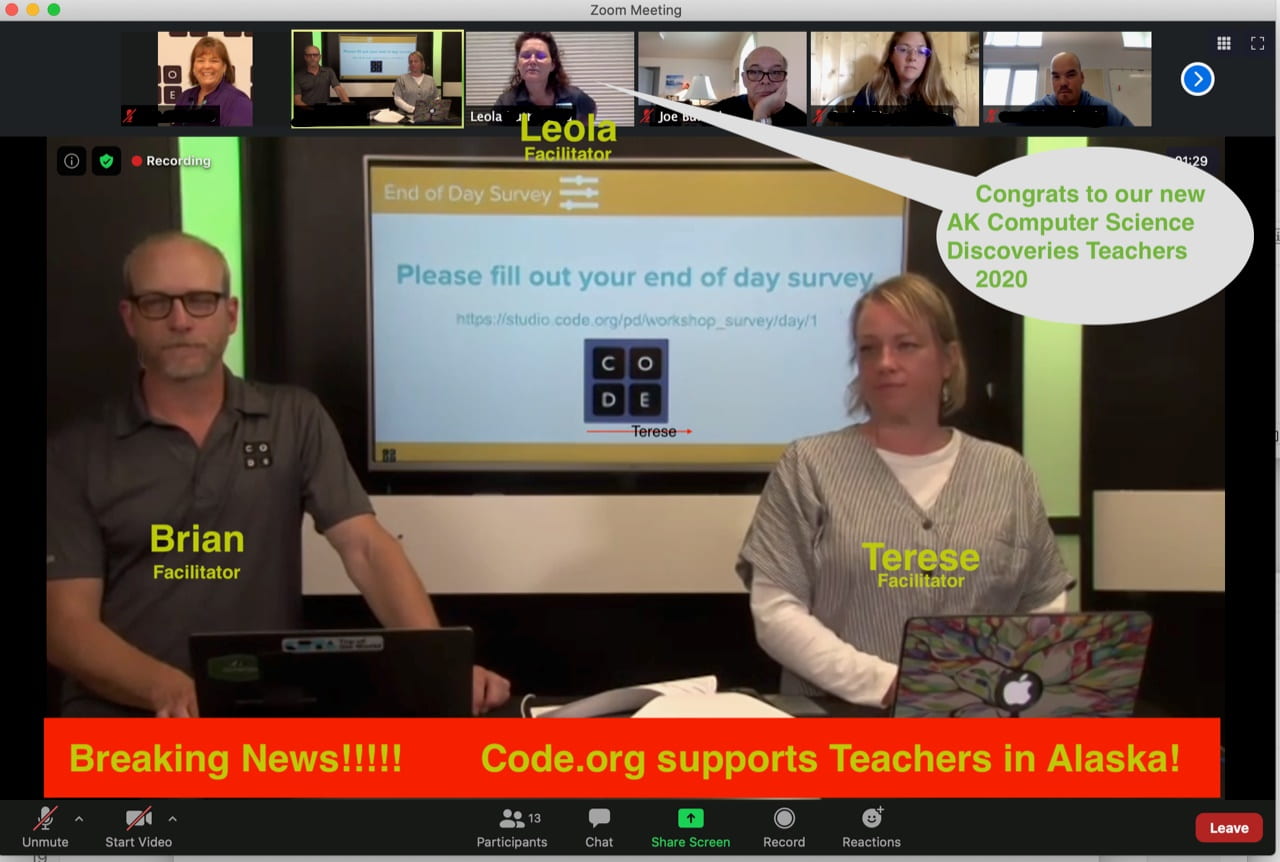Alaska’s PK-12 school system is embracing the teaching of computer science like never before. Educators across the state, and their students, have recognized that navigating the digital world is not just about being a consumer of digital content, it’s about the skills needed to create that content. And to become a creator means knowing the building blocks of how digital content is made using computer science.
Being a creator means that your individual insights and perspectives on the world can be represented and celebrated. Alaskan students experience the world through languages, cultures, climates, and geography that exist nowhere else. To ensure the digital landscape includes space for these unique perspectives, Alaskan students need to be equipped with the right knowledge to meaningfully share what they know and impact how digital spaces represent them. And because we know that Alaska Natives, women, and other people of color are historically underrepresented in the field of computer science, it is critical that we focus our efforts on giving those groups the skills needed to succeed in the digital future.

What’s Happening Now
For the past four years the Alaska Staff Development Network (ASDN), a division of the Alaska Council of School Administrators, (ACSA) has served as the Regional Partner for the international non-profit Code.org. Code.org has provided millions of educators and students around the world with free curriculum guidance to learn the principals of computer science and computational thinking. In just four years, ASDN has helped over 740 Alaskan Pk-12 educators learn how to teach computer science through a series of professional learning opportunities across all grade levels. Each summer, ASDN looks back on our Regional Partner work for the year to reflect and celebrate. The 2020/21 school year was like no other, but despite the complications of COVID-19, so much worth noting was accomplished by the community of computer science educators around our state. Here’s a rundown of accomplishments: 
See the full ASDN Regional Partner Impact Report HERE
Of the Regional Partner professional learning opportunities, one elementary school teacher noted:
“The Code.org summer training…was FANTASTIC. Very practical, met a clear need, provided all the materials needed to get started on day one upon returning to the classroom, lots on ongoing support, intellectually engaging, equitable, super organized with minimal wasted time, a comfortable learning environment, and provided open doors and opportunities to our students. All PD should be like this.”
On top of the Code.org work, the education community across Alaska is building out many dynamic opportunities to make computer science fundamental to the educational experience of Alaskan students. For example, in the rural Yukon River region, the Yukon-Koyukuk School District is developing a systemic computer science program across its school sites using Code.org and professional learning communities that introduces educators and students alike to Sphero robotics and Micro:Bit programming. In the Matanuska-Susitna Borough School District, the district has partnered with the Matanuska Telecom Association (MTA) to provide a week-long Girls Who Code computer science camp for middle and high school girls. And finally, Alaska now has its own statewide chapter of the Computer Science Teachers Association (CSTA) named the ‘Top of the World’ chapter. These are only a handful of incredible efforts happening at the grassroots, reflecting the excitement around K-12 computer science instruction in our state.

The Future
As we look forward, there is a need to provide more opportunities for teachers to have access to professional learning and for students to have access to computer science curriculum. Practically, this might mean securing sustainable funding to invest in computer science teachers, as has happened in other states, and might also include creating endorsements for those teachers who have accomplished mastery. There is also a need to expand our vision for what an investment in computer science can mean.
During the last week in August, President Biden convened a meeting at the White House to specifically focus on America’s cybersecurity needs. Hadi Partovi, the founder of Code.org, was in attendance and offered the following thoughts:
“Mr. President, America’s cybersecurity problem is an education problem. It’s not just the challenge to staff the cyber defense workforce, with hundreds of thousands of unfilled job openings, with well-paying jobs even for people with 2-year degrees. It’s an education problem because the weakest link in our cyber defenses is people — people who don’t know the basics of how to stay safe online.”
Mr. Partovi added:
“If you look around, every CEO is nodding their head because they know we need a plan to educate every American on basic cyber security hygiene, and also a plan to staff up our cyber defense workforce. This needs to start early, in K-12, and reach everybody.”
Talking about cybersecurity is one of the easiest ways to communicate the need for a comprehensive approach to introducing students to computer science. Even in Alaska, we increasingly need a ready workforce that can protect the digital assets that drive our economy and sustain our communities. Teaching computer science, and cybersecurity principles specifically, provides that opportunity.
Recently Code.org has committed to expand their support for cybersecurity education, and ACSA through ASDN is deeply committed to partnering in that expansion to benefit all Alaskan students and educators.

As we look to the future, our hope is that more and more educators will join their peers in expanding the footprint of opportunity for Alaskan students. Computer science skills secure a place for our students in the evolving global economy, ensuring them access to jobs, platforms of expression, information, and limitless opportunity. Perhaps most importantly, these skills help integrate Alaskan identity into the digital world, and fold the digital world into our Alaskan identity.
For more information about ACSA/ASDN’s Code.org Regional Partner program, please contact Program Manager Cheryl Bobo cbobo@alaskaacsa.org.